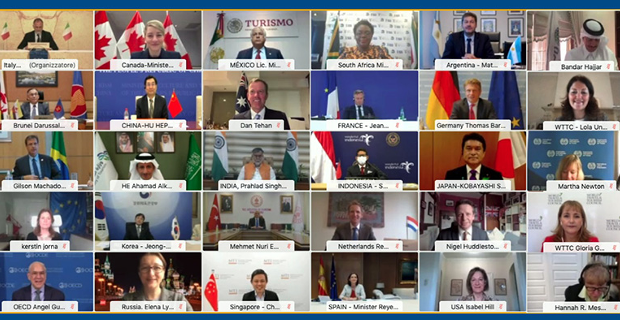|
ILO Deputy Director-General, Martha Newton, called on G20 countries to take action to support the travel and tourism industry, which has been hard hit by the COVID-19 pandemic. She was speaking at a virtual G20 Tourism Ministers’ meeting on 4 May, that discussed how governments can support the sector.
The COVID-19 pandemic has decimated the world of work. The equivalent of 255 million jobs was lost in 2020. This is four times more than during the 2009 financial crisis. The tourism sector is among the hardest hit. The industry employs some 300 million workers globally, of which many are in precarious or informal work. Protecting these workers and their incomes must continue to be a priority. And sustaining the livelihoods that depend on the sector too.
Three actions are essential to support a recovery of travel and tourism that is based on decent work.
First, measures to support travel and tourism enterprises, workers and incomes must target the most vulnerable, including women, youth and migrants who make up the majority of the tourism workforce. For a sector dominated by informality, extending social protection to its informal economy workers and investing in the transition of the sector from the informal to the formal economy should be a priority in recovery plans.
Secondly, measures to ensure safety and health at work are indispensable for a safe reopening and recovery of the tourism sector, as well as to rebuild confidence and resume work. International labour standards provide the tried and tested normative framework for a safe return to work.
Thirdly, rebuilding tourism is an opportunity to transform and build a more sustainable sector. As economies restart, the tourism sector must lead the transition to a green economy with coordinated public and private policies addressing climate change. The potential of the sector to create quality green jobs is yet to be fully realized. In this respect, the ILO welcomes the G20 Guidelines for resilient, sustainable and inclusive tourism and the Principles for the transition to a green travel and tourism industry prepared with the G20 Tourism Working Group.
Let me conclude by reminding us all that no country can recover alone. A successful reactivation of the labour-intensive tourism industry depends on inter-institutional and cross-sectoral cooperation, a whole-of-government approach, backed up by strong policy co-ordination at the international level. Social dialogue between governments, employers, workers and their representatives is more important than ever for developing creative solutions and the trust needed for a safe return to work.
|



